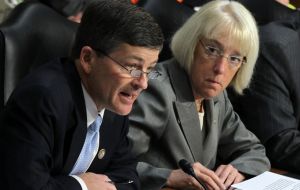MercoPress. South Atlantic News Agency
US political stalemate as the Congress fails to agree on budget cuts and debt
 Representative Jeb Hensarling and Senator Patty Murray: ‘we are still hopeful’
Representative Jeb Hensarling and Senator Patty Murray: ‘we are still hopeful’ A special debt-reduction committee in the US Congress failed to reach agreement, extending partisan gridlock into the 2012 election year and setting the stage for 1.2 trillion dollars in automatic spending cuts.
“After months of hard work and intense deliberations, we have come to the conclusion today that it will not be possible to make any bipartisan agreement available to the public before the committee’s deadline,” panel co-chairmen Representative Jeb Hensarling of Texas and Senator Patty Murray of Washington said in an e-mailed statement.
The two said they “remain hopeful that Congress can build on this committee’s work and can find a way to tackle this issue in a way that works for the American people and our economy.”
Standard & Poor’s said it would keep the US government’s credit rating at AA+ after the super-committee’s announcement. S&P, which stripped the US of its top AAA grade on Aug. 5, said it decided that the failure didn’t merit another downgrade.
The official announcement of failure by super-committee came after members spent the day shuttling between meetings to try to reach a last-ditch accord on at least 1.2 trillion dollars in cuts. The super-committee was supposed to end an impasse in Washington after talks over the past year aimed at reducing the deficit collapsed amid partisan wrangling.
Both parties have blamed each other for the stalemate, with Democrats saying Republicans wouldn’t relent on taxes and Republicans accusing Democrats of rejecting an offer to raise revenue along with spending cuts.
“While I am disappointed, the House will forge ahead with the commitments we have made to reducing government spending and removing barriers standing in the way of private-sector job creation,” said House Speaker John Boehner in a statement. “Doing otherwise is not an option.”
Senate Republican Leader Mitch McConnell said in a statement that Democrats rejected two “good-faith” Republican proposals.
“We’ll continue our efforts to reduce the size of Washington, reform and protect the entitlement system for future generations, and create a better environment for job growth,” he said.
Senate Majority Leader Harry Reid said in a statement, “Republicans relentlessly sought to end Medicare as we know it by privatizing the program and putting seniors and future generations at the mercy of insurance companies” and insisted on expanding tax cuts to millionaires.
To stave off automatic spending cuts in the federal budget starting in 2013, the super committee had been tasked with finding ways to cut deficits by at least 1.2 trillion dollars over 10 years.




Top Comments
Disclaimer & comment rulesCommenting for this story is now closed.
If you have a Facebook account, become a fan and comment on our Facebook Page!